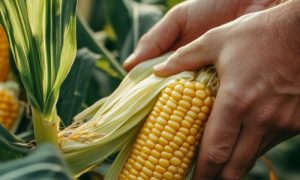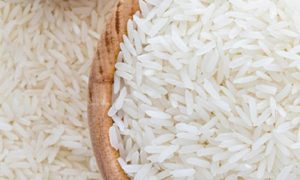Genetically modified corn is welcome but won’t help much

The iconic green cornfields of the US Midwest are about to shrink—not in acreage, but in stature. A new genetically modified (GMO) corn varietal stands on fatter stalks and grows about a third shorter than the height of conventional corn. Dubbed ‘smart corn’ by its developer, Bayer, this well-timed mutant has been designed to withstand the increasingly costly pressures of climate change. The implications are as harrowing as they are inspiring—and not because stubbier corn is genetically modified. I’ve argued before that GMO crop breeding, which inserts bits of DNA from one species of plant into the genome of another, can be judiciously applied for global benefit.
Short-stature corn is harrowing because it’s yet another recent example of an ingenious adaptation that’s making it easier for policymakers, investors and voters to avoid solving the challenge at hand: climate change. New methods of acclimating to the climate crisis are worth celebrating, but they should also be considered a clarion call to solve the problem at its root.
Bayer’s smart corn was recently determined by the US department of agriculture to be safe for American farmers to grow. It still requires sign-off from the Environmental Protection Agency, pending reviews of its ecological effects. Approval is likely, in part because many other GMO crops have already been deemed environmentally benign. Moreover, this is one of the first crops designed for the purpose of addressing environmental factors.
Damage to corn and soy crops is becoming more costly as high-wind storms intensify in the climate change era. In the US these phenomena, known as derechos, have been devastating farms throughout the Midwest with 160kmph winds that caused billions of dollars of damage across millions of acres of crops in 2020 alone.
Understandably, demand is growing for a crop with shorter, fatter stalks that stands a better chance against high-wind storms. Previous types of corn developed through traditional hybrid breeding methods have had reduced stalk height, and these crops have fared better in storms. The new GMO varietal is stronger still: Bayer modified the corn plant with a foreign gene that inhibits the production of the plant growth hormone gibberellic acid, enabling the corn to produce the same amount of fruit on much shorter but stronger stalks.
The introduction of short corn comes on the heels of other notable crops designed for climate adaption. Last year, the US Food and Drug Administration approved HB4, a new wheat varietal engineered for drought tolerance with a gene borrowed from a sunflower. Pioneered by the Argentine firm Bioceres, it was recognized as an early milestone among crops designed to survive in climate-stressed conditions. And earlier this month, fertilizer giant Nutrien announced plans to distribute a new GMO soybean created by the startup ZeaKal Inc. The soybean is engineered with a foreign gene that accelerates photosynthesis, allowing the crop to soak up more carbon dioxide from the atmosphere while also producing more abundant yields.
Let’s be clear that the innovations will not, on their own, entirely solve farmers’ climate woes. Bayer’s smart corn is engineered like traditional corn to be tended and harvested by heavy machinery, yet derechos can bring so much rain that machinery often sinks in the fields. Moreover, heavy rainfall can cause plant roots to become sodden and die, no matter how tall or short the corn is. There is also the pressure of heat, which has been scorching farms this summer in the US Midwest.
It doesn’t take much to see what agriculture will look like down the line: plants engineered not just for wind resistance but also for drought and heat resilience and flood tolerance. Plants that can endure shifting seasons, temperature swings and invasive insects. Crops of the future won’t just need one foreign gene to survive the manifold pressures of climate change, they’ll need dozens.
The GMO debate has gone from skirmishes about labelling corn chips to matters of survival. Bayer’s new product has helped usher in a fairly sudden plot twist in the story of US agriculture. The conflict between the farming industry and environmentalists over GMO crops has been replaced by discussions about how genetic engineering can help humanity endure a hotter world. Such crops are a testament to our capacity to solve problems. But the more ingenious our methods, the more likely we are to avoid fixing the core issues driving the crisis. As the effects of climate change intensify, human beings will be stuck in an endless cycle of increasingly frantic adaptions if we don’t focus on decarbonizing economic output and preserving the delicate balance of the ecosystems we depend on.
Amanda Little is a Bloomberg Opinion columnist covering agriculture and climate.















